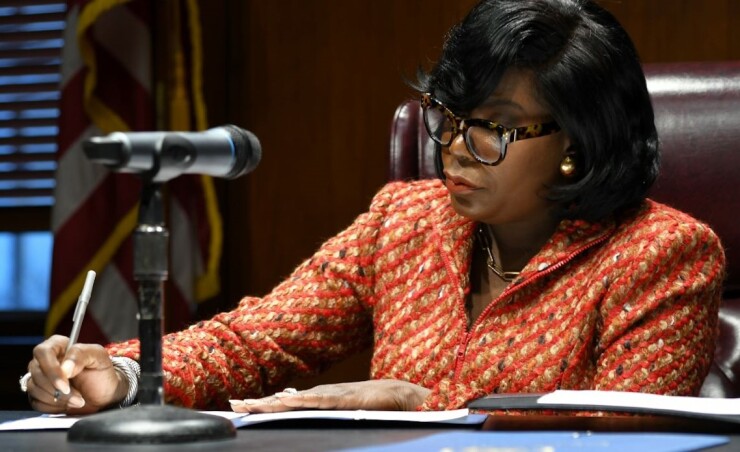Philadelphia Mayor Cherelle Parker delivered her $6.29 billion fiscal 2025 budget, five-year financial and strategic plan and six-year capital program to the City Council on Thursday, with plans to hit the bond market.
The fiscal 2025
“This almost $880 million city commitment will help leverage $5.2 billion from federal, state, private and city self-sustaining enterprise, operating and revolving fund sources for a total fiscal 2025 proposed [capital] budget of $6.08 billion,” the proposal says.
Philadelphia Mayor’s Office
Over six years, the fiscal 2025-2030 recommended capital program includes more than $1.41 billion in new GO issuance as part of a proposed $16.2 billion in total capital investment.
“It’s my
Parker, a Democrat, is Philadelphia’s first woman mayor. She was formerly a public school teacher, a state legislator and member of the City Council, where she was majority leader.
Parker said the city’s fiscal health was good overall.
“We’re making contributions to the budget stabilization reserve fund,” she said. “We’re continuing the excellent trajectory of the city’s pension fund, which just reached a 62% funding level — the highest level in decades. Even better? It’s due to hit 80% in fiscal 2029 and 100% by fiscal 2033.”
She said that by fiscal 2030, the city’s debt service is projected to go down by $200 million.
“Our actions over the coming years will free up over a half billion dollars annually for future budgets,” she said. “Imagine what a half a billion dollars could do.”
Still, she noted bad news, along with the good.
“In the 1990s, the city had to make a tough decision — it borrowed $1.3 billion to shore up our pension fund. We’re still paying for it today,” Parker said. “From now through fiscal 2029, we’ll pay $1 billion in debt service, including an $80 million balloon payment due in 2029.”
She also noted there was lower-than-expected growth in wage and real estate transfer taxes, which saw a decline of about $300 million. The city is also spending down the last of its American Rescue Plan Act (ARPA) funds this year.
“In facing those challenges, I need everyone — rating agencies, our intergovernmental partners, PICA, the controller — to know how seriously I take our city’s fiscal stability,” she said. “I’ll make sure my administration is a responsible steward of the city’s finances.”
The budget includes no new taxes, but some spending increases.
“My ‘One Philly Budget’ invests $2 billion over five years in new operating and capital dollars focusing on five pillars — public safety, clean and green, economic opportunity, housing and education,” she said.
The budget makes investments in public safety of $150 million in operating cash and $471 million in capital funding.
Following a court ruling in 2023 that said the state system of funding public schools violates the constitutional rights of students in poorer school districts, the state recommended $1.4 billion in spending for Philadelphia schools over the next seven years.
Gov. Ben Shapiro has proposed $242 million more in education funds for the school district this year.
“My ‘One Philly Budget’ includes over $24 million in new operating investments for education, with nearly $140 million over the life of the plan.”
The mayor has also proposed shifting the share of the real property tax that goes to the school district to 56% from 55%. Over the life of the plan, that would mean an extra $119 million for the district.
The budget also includes a plan for full-day and year-round schooling — offering students educational enrichment throughout the year, with schedules that work for working families.
The Mayor’s Office of Education will coordinate the multi-year rollout of this initiative, which will launch in 20 pilot schools in the Fall.
She also said the city needs to modernize existing schools and build new ones.
“Doing so is no small task. It requires an intergovernmental strategy,” she said. “But it also presents an opportunity. Imagine our Building Trades giving students on-the-job training in restoring and building schools, and then welcoming them into the union workforce. Today’s generation building for the next.”
The budget also includes $10 million for the Community College of Philadelphia to establish the City College for Municipal Employment, the first-in-the-nation, a partnership between the city, community college and the Philadelphia school district.
“Who’s going to go to City College? High school students; people looking to change careers; current municipal workers who want to upskill. Anyone interested in working in city government,” Parker said.
“They’ll earn a stipend while they learn and graduate into good city jobs. Jobs that have long been a pathway to the middle-class for black and brown people, for women, for immigrants. Jobs with dignity,” she said.
In April 2023,
The city had about $3.75 billion of tax-supported debt outstanding as of 2022 fiscal year end.
“The upgrade of the city’s issuer rating to A1 reflects its materially improved finances over the last several years as well as a steady tax base recovery following the coronavirus pandemic,” Moody’s said at the time.
Also last year, S&P Global Ratings revised its outlook to positive from stable on the city’s GOs and city service agreement revenue bonds and affirmed the A rating on the GOs and city service agreement revenue bonds.
“The outlook revision reflects our expectation that there is at least a one-in-three chance that we will raise the rating within the next two years if the city is able to maintain reserves at levels we consider strong to adequate, while making contributions to its budget stabilization reserve and returning to structural balance, in line with its current projections,” S&P credit analyst Cora Bruemmer said at the time.
In 2022, Fitch Ratings raised Philadelphia’s GO and issuer default rating to A from A-minus with a stable outlook.
“The IDR and bond ratings upgrade to A from A-minus reflects the city’s materially improved operating performance due to a robust tax revenue rebound and management’s proactive budgetary actions,” Fitch said at the time.
